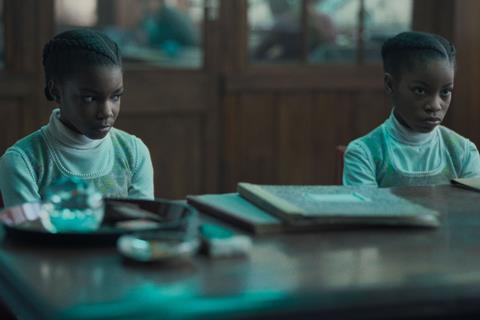
At the core of the Geneva International Film Festival (GIFF) and its parallel Geneva Digital Market (GDM) is the exploration of the evolution of stories and the innovations in the way they are told, says GIFF artistic director Anais Emery, of the event that is taking place in Switzerland from November 4-13.
This year will be the 28th edition of the festival and the second under the stewardship of Emery who joined in January 2021 after several years as artistic director of fellow Swiss festival, Neuchâtel International Fantastic Film Festival.
She says the line-up will focus on innovative storytelling delivered via the myriad audiovisual mediums now available to creators. It will include films, tv series and web content to installations, virtual reality and extended reality (XR) works.
“Even if we have the name, we are not a film festival. We are a festival of audiovisual culture, we want to seize the artistic challenge, and also the industrial challenge and the challenge of that relationship with the audience here at GIFF,” says Emery. “We are focused on creating a dialogue and reflection about the evolution and the innovation in terms of artistic opportunities.”
This year’s GIFF sees the return of Virtual Territories, a 600m2 venue ane sidebar dedicated to digital creation, thought to be the biggest in Europe, which will showcase around 40 works.
It is hosting two major immersive installations: One is an immersive play Les Aveugles, based on the iconic text by Maurice Maeterlinck; the other is the European debut of virtual reality event Evolver, narrated by Cate Blanchett and executive produced by Edward R. Pressman, Terrence Malick and French studio Atlas V. It combines Blanchett’s voice with psychedelic images, open-eyed meditation, music to create a contemplative exploration of the human body.
“We try to allow people to go into the storytelling of the worlds as soon as they get in the festival’s Virtual Territories space,” says Emery. “We want to put the technology behind and the experience in front.”
The 10th edition of the Geneva Digital Market runs during the festival from November 7 to 11 with its mix of masterclasses, roundtables and discussions across topics including digital platforms and latest digital innovations for the audiovisual sector to the ecological impact of digital use.
Traditional cinema

Feature films have a significant role to play at GIFF and the event is an important national launch to audiences. The lineup includies arthouse titles such as Silent Twins, the English-language debut of Polish filmmaker Agnieszka Smoczynska which premiered at Un Certain Regard in Cannes this year. Also screening are Phyllis Nagy’s Sundance title Call Jane, starring Sigourney Weaver and Elizabeth Banks, and François Pirot’s Swiss-Belgian co-production Ailleurs Si j’y Suis, starring Jean-Luc Bideau, which will make its Swiss debut with filmmaker and star expected in town.
The international feature film competition will see 10 titles compete for the Reflet d’Or, which comes with a CHF10,000 (€10,000) purse from the City of Geneva. The selection includes Alice Diop’s debut fiction feature Saint Omer, which is France’s entry to the best international film Oscar category, Korean filmmaker Shin Su-Won’s Hommage, a film billed as a love letter to female filmmakers and the Japanese animation Inu-oh from Masaaki Yuasa.
Further competition titles include Cristina Grosan’s Ordinary Failures and Goutte d’Or, from filmmaker Clement Cogitore.
The festival has achieved gender parity in the international competition selection. “We worked hard for that,” says Emery. “Our policy is that we don’t show too many titles in GIFF so we can properly platform the ones we do show.”
The international jury will be headed by Iranian filmmaker Mani Haghighi, whose latest film Subtraction is screening at GIFF. Festival organisers hope Haghighi will be able to travel to Switzerland in person following a last-minute travel ban imposed on him by the Iranian government just as he was due to journey to the BFI London Film Festival in October.
“The Festival is concerned about the Iranian government’s attacks on the freedom of expression and movement of its people,” said GIFF organisers in a statement in October. “The GIFF also wishes to show its support for Iranian artists who are victims of intolerable repression. The Festival will not change the president of the jury and is in contact with Mani Haghighi in order to allow him to participate in the Festival either on site or online.”
There are two further competition strands for best series and best immersive work, each offering a €10,000 cash prize.The latter will be chosen from 10 works in virtual reality, augmented reality, mixed reality, exploring the connections between narrative and technology.
GIFF will also host the European Script Award for a third year, which offers a €10,000 prize to a new, original series from a rising European screenwriter.
Danish director Nicolas Winding Refn will be honoured with the Geneva Award ahead of the Swiss premiere of his Netflix series Copenhagen Cowboy. Also receiving an honour is filmmaker and actor Alexandre Astier with The Film & Beyond award.
“What’s interesting for us [at GIFF}] is to see how the audiovisual medium is giving tools to the storytellers to evolve,” Emery says. “We always follow new trends, not because we want to be technological or immersive or because it’s a new thing, but because we want to show how emerging technologies serve the imagination above all.”

























No comments yet